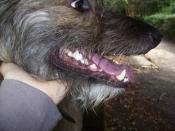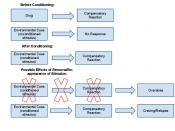Learning can be defined as "1 : the act or experience of one that learns 2 : knowledge or skill acquired by instruction or study 3 : modification of a behavioral tendency by experience (as exposure to conditioning)" (Learning, 2008). The first definition describes learning as an active process, the second definition defines learning as a result; something acquired having a potential of changing behavior, while the third definition is more scientifically usable because it describes an observable change of behavior as a result of learning. For the purpose of this paper, definition 3 is the most valid while definition 2 could be considered a more vague description of future potential of behavioral change. Behavior is thus the observable result of learning. If there has been no change in behavior after a learning event, then it cannot be assumed that learning has occurred.
Psychologists consider two types of learning: Classical conditioning and instrumental conditioning.
The term "conditioning" is preferred over the term "learning" because conditioning is a term that specifically describes procedures to modify behavior (Hergenhahn, B.R. Olson, M.H., 2005). "Classical conditioning is best exemplified by Pavlov and his dogs. Pavlov formulated the unconditioned and the conditioned stimulus and the associated stimulus response processes (Pavlov, I.P., 1927). Pavlov determined that an unconditioned stimulus (a stimulus in its natural state) would provoke an unconditioned response (again unaltered). Show food to a dog and the dog will start to salivate. However, by altering the stimulus, such as ringing a bell prior to the presenting of the food, the dog will learn to associate the bell tone with food and begin to salivate after the bell is struck but before the food is presented. This Pavlov termed a conditioned stimulus and conditioned response. Instrumental conditioning is in a manner the opposite of classical...


